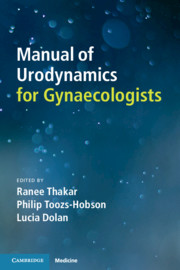Book contents
- Manual of Urodynamics for Gynaecologists
- Additional material
- Manual of Urodynamics for Gynaecologists
- Copyright page
- Contents
- Contributors
- Preface
- Preface to Urodynamics Illustrated
- Chapter 1 Pre-test Assessment of Urinary Dysfunction, Using Patient-Centred Questionnaires
- Chapter 2 The Assessment of Women with Lower Urinary Tract Dysfunction, Using Bladder Diaries
- Chapter 3 Pad Testing in the Assessment of Urinary Incontinence in Women
- Chapter 4 Setting Up the Urodynamic Equipment
- Chapter 5 Urodynamic Flow Rate Testing
- Chapter 6 The Cystometrogram
- Chapter 7 Videocystourethrography
- Chapter 8 Ambulatory Urodynamic Monitoring
- Chapter 9 Urodynamic Artefacts
- Chapter 10 The Assessment of Urethral Function
- Chapter 11 Urodynamics in the Neurological Patient
- Chapter 12 Urodynamic Terminology
- Index
- References
Chapter 8 - Ambulatory Urodynamic Monitoring
Published online by Cambridge University Press: 10 April 2020
- Manual of Urodynamics for Gynaecologists
- Additional material
- Manual of Urodynamics for Gynaecologists
- Copyright page
- Contents
- Contributors
- Preface
- Preface to Urodynamics Illustrated
- Chapter 1 Pre-test Assessment of Urinary Dysfunction, Using Patient-Centred Questionnaires
- Chapter 2 The Assessment of Women with Lower Urinary Tract Dysfunction, Using Bladder Diaries
- Chapter 3 Pad Testing in the Assessment of Urinary Incontinence in Women
- Chapter 4 Setting Up the Urodynamic Equipment
- Chapter 5 Urodynamic Flow Rate Testing
- Chapter 6 The Cystometrogram
- Chapter 7 Videocystourethrography
- Chapter 8 Ambulatory Urodynamic Monitoring
- Chapter 9 Urodynamic Artefacts
- Chapter 10 The Assessment of Urethral Function
- Chapter 11 Urodynamics in the Neurological Patient
- Chapter 12 Urodynamic Terminology
- Index
- References
Summary
Conventional urodynamics (laboratory cystometry) is considered the ‘gold standard’ for measuring bladder function. However, it is a static short test, typically 20–30 minutes, and is considered ‘nonphysiological’. It involves rapid retrograde filling of the bladder in a laboratory setting, which does not always allow reliable reproduction of symptoms. Ambulatory urodynamic monitoring (AUM) relies on physiological bladder filling with natural stressors, including patient mobilisation over a longer time frame, to monitor bladder function which can then be directly compared to presenting symptoms. It is a useful additional test for women in whom conventional urodynamics fails to reproduce or explain the lower urinary tract symptoms of which they complain [1]. AUM is performed through a portable system which allows information to be recorded digitally, and downloaded and reviewed during or at the end of the test. The trace can then be expanded or compressed without loss of information.
Information
- Type
- Chapter
- Information
- Manual of Urodynamics for Gynaecologists , pp. 59 - 70Publisher: Cambridge University PressPrint publication year: 2020
